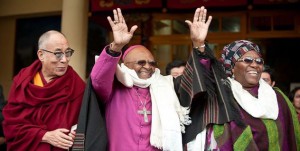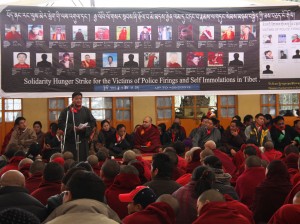
Anti apartheid icon, Archbishop Desmond Tutu, begged the Chinese government to respect His Holiness the Dalai Lama during a joyful meeting between the Nobel Peace laureates on Friday, February 10th. Addressing the thousands of monks, nuns, families and schoolchildren who turned out in brilliant sunshine to see the holy pair at the Main Temple in McLeod Ganj, Archbishop Tutu described the 77-year-old Tibetan spiritual leader as the holiest man he has ever met, adding: ‘I want to say to the Chinese government that His Holiness is the most peace loving person on earth.
‘His Holiness has no army. He does not command people with guns. His Holiness is not a separatist.
‘Please you leaders in Beijing. Please respect him.’
Devotees and well-wishers began filling the Main Temple at dawn, before His Holiness travelled to Kangra Airport to receive the South African Archbishop and his wife, Nomalizo Leah Shenxane, who scheduled the visit to his old friend as part of a five day visit to India to promote Girls Not Brides, a global initiative against child marriage.
In October, Archbishop Tutu launched an angry verbal attack on South Africa’s ANC government, branding it ‘worse than the apartheid government’ and threatening to pray for the party’s defeat,
after it failed to grant His Holiness a visa so that he could deliver a lecture at the Archbishop’s 80th birthday celebrations.
During the public ceremony in the Main Temple, ArchbishopTutu stated that he could now ‘really celebrate’ his birthday, and playfully jibed his fellow Nobel Peace Prize laureate, recounting the time he accompanied His Holiness to a Seattle football stadium packed with 60,000 people who had turned out ‘for someone who can’t even speak English properly!’
Emphasizing between giggles that he is not jealous of the fact that His Holiness is ‘loved by everybody in the world,’ Archbishop Tutu promised his friend that he would one day visit him in a free Tibet, urging God to hasten the day.
Presenting Archibsihop Tutu with a Namgyal stupa for good luck, His Holiness, who addressed the crowds in Tibetan and English, commented on their advancing years, adding: ‘Maybe for one or two more decades I will remain, but your spirit will remain at least throughout the 21st century. Of that I’m quite sure.
‘Governments cannot always do much to address negative feelings. Only spiritual leaders can do that.’
Bishop for the Diocese of Amritsar, the Right Rev. P.K. Samanta Roy, representing the church of north India, described Archibishop Tutu as the Mahatma Gandhi of South Africa, stating: ‘He has been an inspiration to millions and he has been my role model since I was a child.’
Expressing the church’s solidarity with the Tibetan people, he said: ‘We believe that this world cannot go on with violence. Archbishop Tutu has shown us the way. His Holiness the Dalai Lama has shown us his way, and we need to follow these leaders who show the solidarity between all faiths.’
His Holiness’s guest of honour was treated to three cultural performances by artists from the Tibetan Institute of Performing Arts, Thangtong Lhugar and Dharamsala’s local Indian Gaddi community.
Archbishop Tutu was awarded the Nobel Peace Prize in 1984 for his role as a ‘unifying leader figure in the campaign to resolve the problem of apartheid in South Africa.’





 Print
Print Email
Email